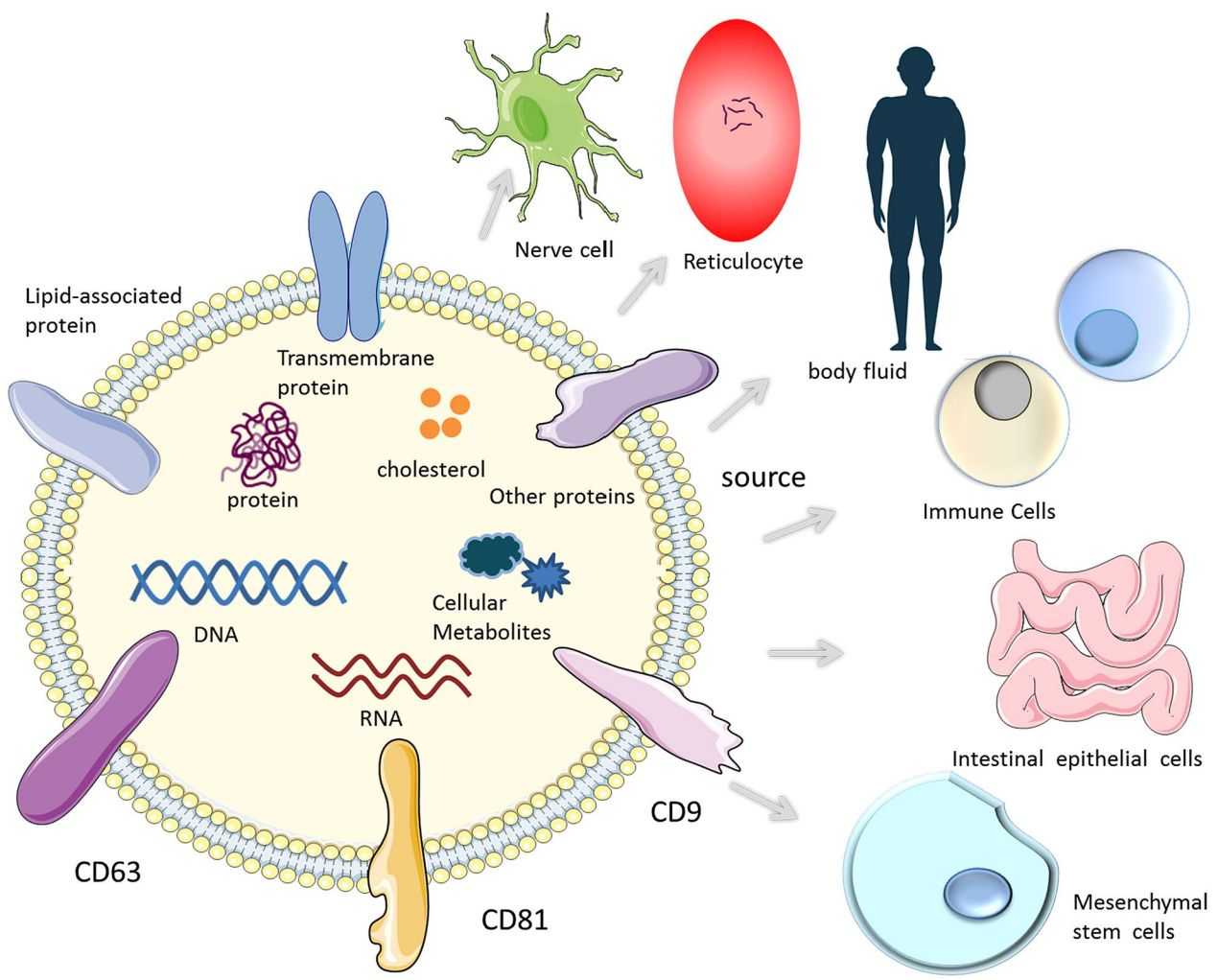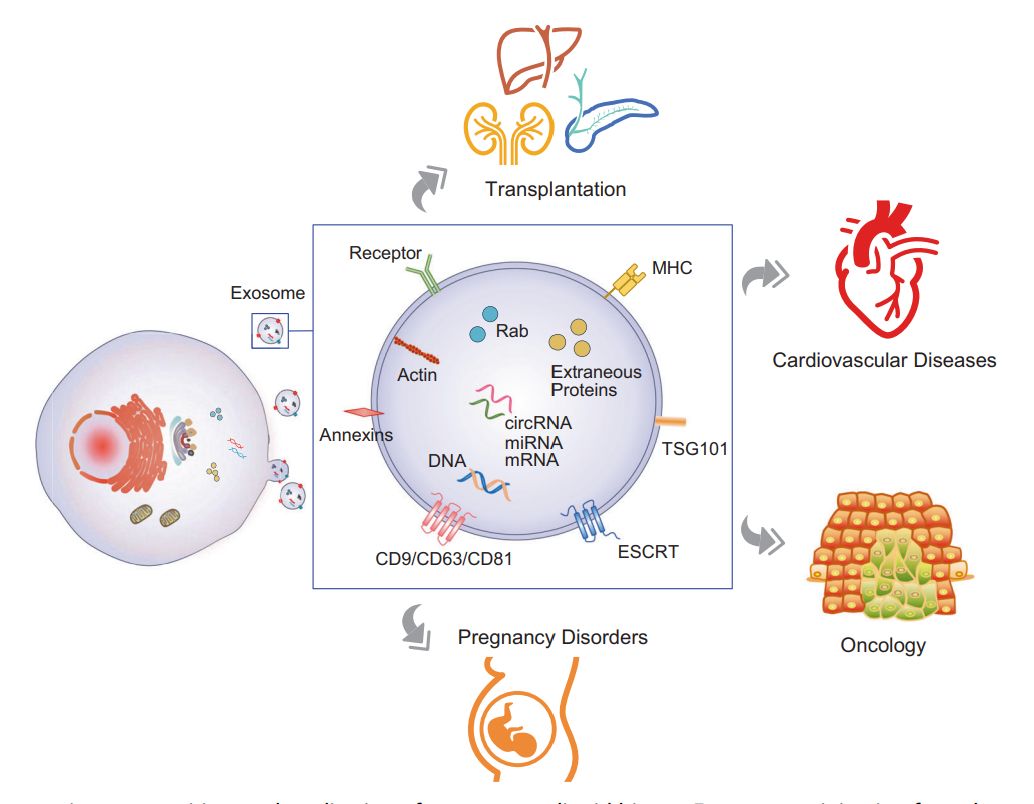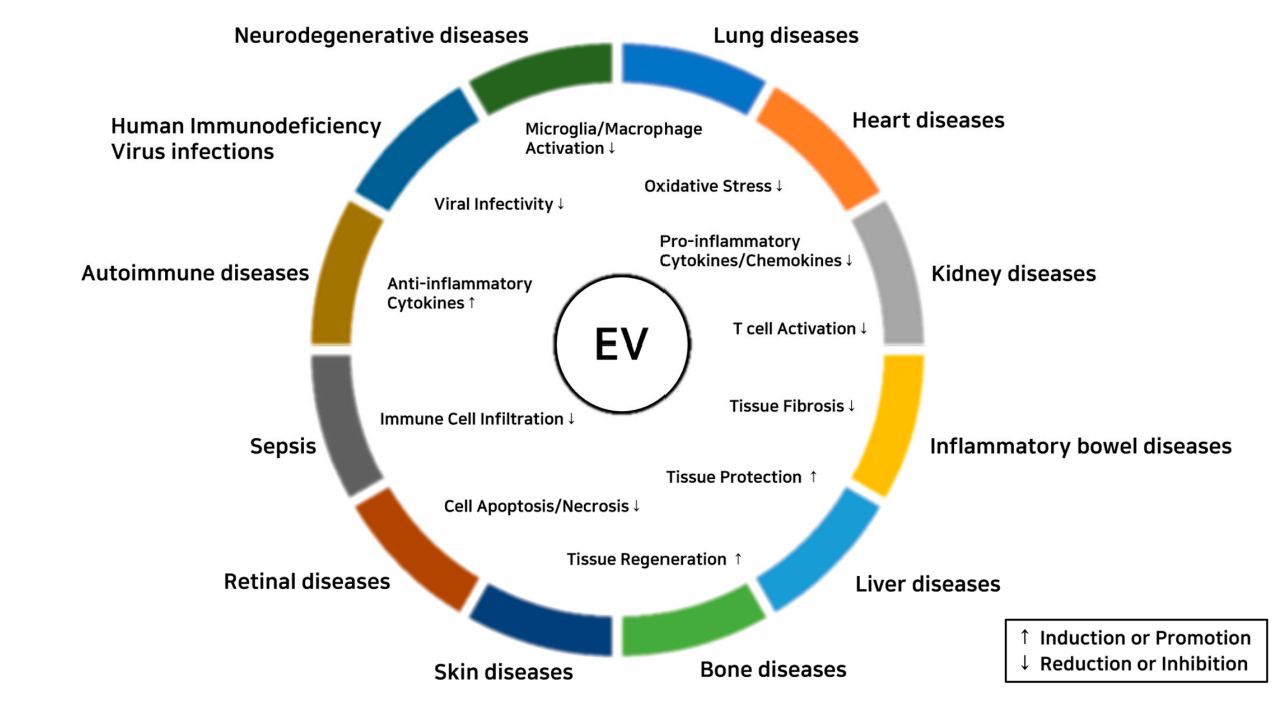Exosomes in Chronic Disease Diagnosis and Therapies
Exosomes are involved in basic life processes in the human body such as intercellular energy conversion, information recognition and transfer, and material transportation. The biological significance of exosomes has been well researched and their use in diagnosing and treating chronic diseases (CD) has been greatly developed.
What are Exosomes?
Exosomes are tiny vesicles secreted by cells, with a diameter of about 30-150nm, containing cell-specific proteins, lipids, and small molecules of nucleic acids, such as miRNA, mRNA, lncRNA, and protein. These substances can act as nutrients and bioactive signals from cells to other cells, thus directing the life activities of cells and performing cellular behaviors such as absorption, repair, and growth.
In recent years, studies have found that exosomes have a therapeutic effect on many CD. After entering the body, exosomes can be effectively transferred to specific tissues without aggregating in microvessels, avoiding the possibility of embolism caused by the administered cells.
 Figure 1. Composition and origin of exosomes. (Wu, X, et al., 2022)
Figure 1. Composition and origin of exosomes. (Wu, X, et al., 2022)
Exosomes in the Pathogenesis of CD
Exosomes act as messengers, facilitating intercellular communication and influencing cellular function. This complex interaction may contribute to the development and progression of CD.
Metabolic Diseases - Exosomes from adipose tissue, liver, and pancreas play a crucial role in metabolic diseases such as obesity, diabetes, and NAFLD. They transport factors that promote insulin resistance, inflammation, and lipid accumulation, thereby contributing to disease progression.
Central Nervous System Diseases - Exosomes are implicated in the pathogenesis of neurodegenerative diseases such as Alzheimer's disease, Parkinson's disease, and multiple sclerosis. They can carry misfolded proteins, inflammatory mediators, and microRNAs, leading to neuronal dysfunction and neuroinflammation.
Chronic Lung Disease - In chronic obstructive pulmonary disease (COPD) and asthma, exosomes released from airway epithelial cells, immune cells, and lung fibroblasts can lead to inflammation, airway remodeling, and disease exacerbation.
Cardiovascular Disease - Exosomes from endothelial cells, cardiomyocytes, and platelets are involved in developing atherosclerosis, heart failure, and myocardial infarction. They transport factors that promote inflammation, thrombosis, and vascular dysfunction.
Exosomes as Diagnostic Biomarkers for CD
The unique molecular structure of exosomes makes them attractive candidates for diagnostic biomarkers.
 Figure 2. Exosomes for chronic disease diagnosis. (Zhou, B, et al., 2020)
Figure 2. Exosomes for chronic disease diagnosis. (Zhou, B, et al., 2020)
- Early Disease Detection
Exosomes can be isolated from body fluids such as blood, urine, and cerebrospinal fluid. Their contents reflect cellular status and can be analyzed to detect disease-specific biomarkers for early diagnosis.
- Disease Monitoring
Exosome-based biomarkers can be used to monitor disease progression, treatment response, and disease recurrence. This can help develop personalized treatment strategies and improve patient outcomes.
- Non-invasive Diagnostics
Exosomes can be obtained through minimally invasive procedures, making them a promising alternative to traditional invasive biopsies.
Exosomes as Therapeutic Agents for CD
The therapeutic potential of exosomes lies in their ability to deliver targeted treatments to specific cells and tissues.
 Figure 3. Therapeutic role of extracellular vesicles (EV) in inflammatory diseases. (Suh JH, et al., 2021)
Figure 3. Therapeutic role of extracellular vesicles (EV) in inflammatory diseases. (Suh JH, et al., 2021)
- Drug Delivery Vehicles
Exosomes can be designed to encapsulate and deliver therapeutic proteins, siRNAs, ASO, miRNA, or other bioactive molecules to specific target cells, thereby increasing drug efficacy and minimizing side effects.
- Cell-free Therapy
Exosomes from healthy cells can be used as cell-free therapy to deliver beneficial factors to diseased cells to promote tissue repair and regeneration.
- Immunomodulation
Exosomes can modulate the immune response and may provide therapeutic benefits for autoimmune diseases.
Advantages of Exosomes in Chronic Disease Administration
- Targeted Delivery - Exosomes naturally target specific cells and tissues, thereby enhancing therapeutic efficacy and minimizing off-target effects.
- Biocompatibility - Exosomes are naturally occurring and well tolerated by the body, reducing the risk of adverse reactions.
- Stability - Exosomes are relatively stable in biological fluids, making them suitable for therapeutic applications.
- Non-invasive Administration - Exosomes can be administered via multiple routes, including intravenous, oral, and topical, providing convenient and minimally invasive therapeutic options.
Our Services and Products
Exosomes have emerged as promising players in the field of chronic disease management, with great potential as diagnostic biomarkers as well as therapeutic agents.
As a leader in exosome research, Creative Biostructure provides high-quality exosome products and efficient exosome services. Feel free to contact us for detailed information.
| Cat No. | Product Name | Source |
| Exo-HDBF-01 | HQExo™ Exosome-SDH-Alzheimer's plasma | Exosome derived from Single Donor Human Alzheimer's plasma |
| Exo-HDBF-02 | HQExo™ Exosome-SDH-Asthma plasma | Exosome derived from Single Donor Human Asthma plasma |
| Exo-HDBF-07 | HQExo™ Exosome-SDH-Chronic Obstructive Pulmonary Disease plasma | Exosome derived from Single Donor Human Chronic Obstructive Pulmonary Disease plasma |
| Exo-HDBF-10 | HQExo™ Exosome-SDH-Diabetes plasma | Exosome derived from Single Donor Human Diabetes plasma |
| EV-H-030 | Single Donor Human Diabetes Plasma Exosome | / |
| Exo-HDBF-11 | HQExo™ Exosome-SDH-Obesity plasma | Exosome derived from Single Donor Human Obesity plasma |
| Exo-HDBF-12 | HQExo™ Exosome-SDH-Pulmonary Fibrosis plasma | Exosome derived from Single Donor Human Pulmonary Fibrosis plasma |
| Exo-HDBF-13 | HQExo™ Exosome-SDH-Rheumatoid Arthritis plasma | Exosome derived from Single Donor Human Rheumatoid Arthritis plasma |
| Exo-SC01 | HQExo™ Exosome-PCS-500-011 | Exosome derived from human pre-adipose derived mesenchymal stem cell (PCS-500-011) |
| Exo-SC03 | HQExo™ Exosome-hTERT | Exosome derived from hTERT-immortalized Mesenchymal Stem Cell |
| Exo-SC04 | HQExo™ Exosome-MSC | Exosome derived from Xeno-Free Human Mesenchymal Stem/Stromal Cells and Media |
| Exo-SC02-1 | HQExo™ Exosome-PCS-500-012 | Exosome derived from human bone marrow-derived mesenchymal stem cell line (PCS-500-012) |
| Exo-SC02-2 | HQExo™ Exosome-Pla-MSC | Exosome derived from human placental derived mesenchymal stem cell |
| Explore All Exosome Products | ||
References
- Wu, X, et al. Exosome-mediated effects and applications in inflammatory diseases of the digestive system. Eur J Med Res. 2022. 27:163.
- Zhou, B, et al. Application of exosomes as liquid biopsy in clinical diagnosis. Sig Transduct Target Ther. 2020. 5: 144.
- Suh JH, et al. Therapeutic Application of Exosomes in Inflammatory Diseases. International Journal of Molecular Sciences. 2021. 22(3): 1144.